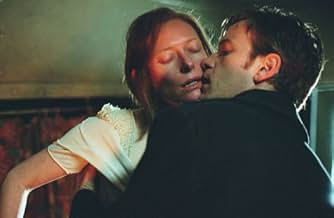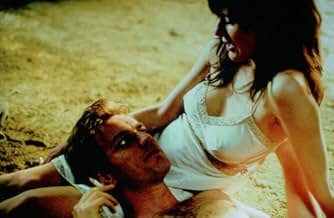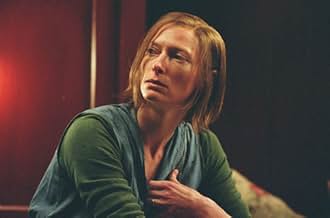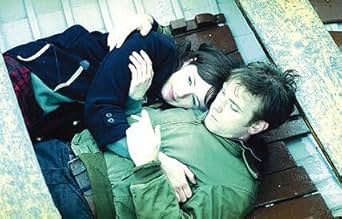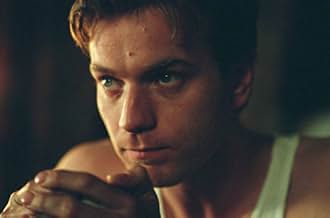A young drifter working on a river barge disrupts his employers' lives while hiding the fact that he knows more about a dead woman found in the river than he admits.A young drifter working on a river barge disrupts his employers' lives while hiding the fact that he knows more about a dead woman found in the river than he admits.A young drifter working on a river barge disrupts his employers' lives while hiding the fact that he knows more about a dead woman found in the river than he admits.
- Director
- Writers
- Stars
- Awards
- 7 wins & 17 nominations total
- Director
- Writers
- All cast & crew
- Production, box office & more at IMDbPro
Featured reviews
The films focus on translating the novels first person perspective is clearly an obsession for this director. Never is the audiences attention allowed outside of Joe's point of view. We see only what he sees, we hear nothing more and we remember his life in little snatches, moments of dark disgusting and secret clarity he keeps from the world.
The film starts with a corpse, a barely dressed woman floating in the Clyde that is fished out by Joe; a young man working the barges for reasons that are not immediately clear. This brutal beginning in which we see Joe lay a tender hand on the cold dead flesh of the girl begins the film with a level of tension that rarely leaves the screen. Through his actions and - more importantly - his inactions we peel away the outer layers of a man on the run from himself, from responsibility and from guilt. We see him commit two murders by mission of inaction and we see him quietly dealing with that in one last lingering shot that tells us he will never change.
Joe is sexually driven to destroy life around him and he uses sex as a weapon against himself and against the possibility of settling or creating a future. He could be a writer, but he lacks the courage to read his own work. He could be a father, but he cannot face the thought of commitment. He could be a lover, but he makes love to women only as a means to an end, rejecting and pushing them away once the act is completed.
And this is the film in a nutshell. A relentless character study of an unpleasant man who punishes those around him for his own failings. Yes there is gratuitous sex in this film, but it has its place, it defines the moments of change in everyone else's lives while underlining the static character of Joe, played with utter brilliance by Ewen McGregor. The sex is cold, rather than erotic, reflecting the characters contempt for those he uses. Without the detailed sex scenes the film would be less than it is, but audiences expected to be titillated will come away disappointed.
Not without flaws this film has that perplexing title and a scene in which Joe beats his girlfriend after covering her with custard. The scene is alien to both the film and the character of Joe who gives no indication of being violent, rather a man that will walk out on a problem rather than face the awful possibility of confrontation. In fact Ewen McGregor seems embarrassed to play this scene, as though he too cannot link this outburst to the character he is playing.
But this minor quibble apart the film remains an artistically shot work, played with brilliance by everyone. Its rare to see a film where the whole cast are brilliant, where the script is clearly cut and the direction thought through. The visual aspect of the film is also tremendous with each shot being laid out in front of us like a painting, a wondrous work of art that moves and flows to show us the 60's post war Brittan with utter clarity.
Hollywood please take note.
The film starts with a corpse, a barely dressed woman floating in the Clyde that is fished out by Joe; a young man working the barges for reasons that are not immediately clear. This brutal beginning in which we see Joe lay a tender hand on the cold dead flesh of the girl begins the film with a level of tension that rarely leaves the screen. Through his actions and - more importantly - his inactions we peel away the outer layers of a man on the run from himself, from responsibility and from guilt. We see him commit two murders by mission of inaction and we see him quietly dealing with that in one last lingering shot that tells us he will never change.
Joe is sexually driven to destroy life around him and he uses sex as a weapon against himself and against the possibility of settling or creating a future. He could be a writer, but he lacks the courage to read his own work. He could be a father, but he cannot face the thought of commitment. He could be a lover, but he makes love to women only as a means to an end, rejecting and pushing them away once the act is completed.
And this is the film in a nutshell. A relentless character study of an unpleasant man who punishes those around him for his own failings. Yes there is gratuitous sex in this film, but it has its place, it defines the moments of change in everyone else's lives while underlining the static character of Joe, played with utter brilliance by Ewen McGregor. The sex is cold, rather than erotic, reflecting the characters contempt for those he uses. Without the detailed sex scenes the film would be less than it is, but audiences expected to be titillated will come away disappointed.
Not without flaws this film has that perplexing title and a scene in which Joe beats his girlfriend after covering her with custard. The scene is alien to both the film and the character of Joe who gives no indication of being violent, rather a man that will walk out on a problem rather than face the awful possibility of confrontation. In fact Ewen McGregor seems embarrassed to play this scene, as though he too cannot link this outburst to the character he is playing.
But this minor quibble apart the film remains an artistically shot work, played with brilliance by everyone. Its rare to see a film where the whole cast are brilliant, where the script is clearly cut and the direction thought through. The visual aspect of the film is also tremendous with each shot being laid out in front of us like a painting, a wondrous work of art that moves and flows to show us the 60's post war Brittan with utter clarity.
Hollywood please take note.
Young Adam is a powerful and atmospheric drama set on the canals between Glasgow and Edinburgh during the 1950s.
Ewan McGregor is Joe, a drifter working on a barge, when he and his boss find a body in the canal. As he begins an affair with the bargeman's wife (Tilda Swinton), we find out more about his previous relationship with the drowned woman (Emily Mortimer).
Adapted from the novel by Scottish Beat writer Alexander Trocchi, Young Adam is, in some ways, a kitchen sink drama a vivid picture of working class life in its unpleasant reality. One of the best examples of this type of film is Room at the Top (1959). But Young Adam has existentialist overtones: Joe is alienated and passive, and not only do his numerous sexual couplings offer him little pleasure, but in rejecting the only thing that could redeem him, he condemns himself to a meaningless life. This might sound too depressing, but screenwriter and director David Mackenzie gives the film great depth and sensuality. Very interesting. ****/***** stars.
Ewan McGregor is Joe, a drifter working on a barge, when he and his boss find a body in the canal. As he begins an affair with the bargeman's wife (Tilda Swinton), we find out more about his previous relationship with the drowned woman (Emily Mortimer).
Adapted from the novel by Scottish Beat writer Alexander Trocchi, Young Adam is, in some ways, a kitchen sink drama a vivid picture of working class life in its unpleasant reality. One of the best examples of this type of film is Room at the Top (1959). But Young Adam has existentialist overtones: Joe is alienated and passive, and not only do his numerous sexual couplings offer him little pleasure, but in rejecting the only thing that could redeem him, he condemns himself to a meaningless life. This might sound too depressing, but screenwriter and director David Mackenzie gives the film great depth and sensuality. Very interesting. ****/***** stars.
One of the more quietly desperate films of recent past, Young Adam is an interesting study of lower working class characters - working poor, perhaps set against an idyllic Scotland river life we have probably never seen. That working barges ply streams with bridges so narrow that crew must guide the craft along by kicking the tunnel-like sides of passage and canals and rivers are so pastorally picturesque is an awfully artful examination of a simpler time.
Joe (Ewan McGregor), a hired hand laboring on a barge-of-all-trades is the bad-boy promiscuous lover of any and all girls within contact. Torrid sex with any and all of them is his single-minded purpose, we gather at first. But we quickly find he 1.) is or was a writer (failed or perhaps more correctly never-started) 2) is linked to a body found in a river and 3) is seemingly incapable of or devoid of emotion. But we are going to alter some our judgments of Joe as more is revealed.
Sexual promiscuity confined to abrupt, even relentless encounters is the main character's focus even though we know it is as unfeelingly given as it seems to be received. In one encounter, nearly violent in its depiction, we cannot see the face of his partner as she cries (or is she laughing?). Interestingly lit, we marvel at this singularly stark depiction of lust. Ella (Tilda Swinton) and her husband Les (Peter Mullan) have employed Joe on their barge and it is not long before we see how Joe has changed the dynamic in the marriage. It is with Les that Joe recovers the body of a woman floating in the river. Curiously Joe cannot manage the use of a boat hook to snare the woman's body; Les has to take over.
The story becomes one of determining who the woman is and how she fits into the story. Through flashbacks we see a disturbing development as as the police investigation of the dead woman ensues; we continue to follow this thread through the course of the film.
The music chosen for the film is unmemorable, but that may serve us well in that it is never a distraction. Time passes during the course of the story, but it could be a week, perhaps six months.
An interesting film, the title has been bandied about for its Biblical reference but reveals little about the matters at hand. In the final analysis the only surprise found in the movie is when a prominent figure merely disappears; consistent with the tempo, it is a profoundly quiet moment. Disturbing at every turn, this is a film charged with raw sexuality and should be seen to appreciate naturalistic film.
Joe (Ewan McGregor), a hired hand laboring on a barge-of-all-trades is the bad-boy promiscuous lover of any and all girls within contact. Torrid sex with any and all of them is his single-minded purpose, we gather at first. But we quickly find he 1.) is or was a writer (failed or perhaps more correctly never-started) 2) is linked to a body found in a river and 3) is seemingly incapable of or devoid of emotion. But we are going to alter some our judgments of Joe as more is revealed.
Sexual promiscuity confined to abrupt, even relentless encounters is the main character's focus even though we know it is as unfeelingly given as it seems to be received. In one encounter, nearly violent in its depiction, we cannot see the face of his partner as she cries (or is she laughing?). Interestingly lit, we marvel at this singularly stark depiction of lust. Ella (Tilda Swinton) and her husband Les (Peter Mullan) have employed Joe on their barge and it is not long before we see how Joe has changed the dynamic in the marriage. It is with Les that Joe recovers the body of a woman floating in the river. Curiously Joe cannot manage the use of a boat hook to snare the woman's body; Les has to take over.
The story becomes one of determining who the woman is and how she fits into the story. Through flashbacks we see a disturbing development as as the police investigation of the dead woman ensues; we continue to follow this thread through the course of the film.
The music chosen for the film is unmemorable, but that may serve us well in that it is never a distraction. Time passes during the course of the story, but it could be a week, perhaps six months.
An interesting film, the title has been bandied about for its Biblical reference but reveals little about the matters at hand. In the final analysis the only surprise found in the movie is when a prominent figure merely disappears; consistent with the tempo, it is a profoundly quiet moment. Disturbing at every turn, this is a film charged with raw sexuality and should be seen to appreciate naturalistic film.
If you love film, you know the first Polanski project, "Knife in the Water." It is a simple project: a couple, plus an extra man, confined on a boat. Sex.
It is an important project, taking the seat of the characters and extending it into a space around them. The challenge for the actors is to project out into a haze that surrounds them. It only works because the space is confined, incidentally in a boat. Orson Welles conceived the idea but his project was unfinished. Polanski finished it.
Polanski's project was told from the perspective of the couple. Presumably the man is a lawyer with his out-of-law wife (his mistress). It is all about laws of various kinds.
Now imagine a project with the identical approach but told from the point of the drifter. What is his story? What is his haze?
Watch the two together if you dare. This time around we have a more ostentatious art: beautiful staging, terrific lighting, hazy score. Absolutely controlled and contained acting. And yet at the same time we have the haze extending to grit, humanity, sweat, rutting.
This time around that reality gives us more explicit and human sex. And more explicit law.
You need to watch this, folks. It is intrinsically deep and engaging. Slow. Meditative. As with a Rembrandt, the meditative but intense emotion draws you into the haze, here shown many times as shadow (or coal dust, or water).
One of our most serious actresses is Ms Tilda. I'll watch anything she chooses to throw herself into.
Ewan chooses intelligent projects. You will discover that our drifter is a writer trying to do something different. It is why things are so hazy and non-linear, the typewriter underwater. The one explicitly folded shot quotes his "Moulin Rouge" folded typing.
If you want to understand how actors put themselves on their skin, then their sweat, then the haze around them that is shared, then into your own haze... watch this.
Ted's Evaluation -- 3 of 3: Worth watching.
It is an important project, taking the seat of the characters and extending it into a space around them. The challenge for the actors is to project out into a haze that surrounds them. It only works because the space is confined, incidentally in a boat. Orson Welles conceived the idea but his project was unfinished. Polanski finished it.
Polanski's project was told from the perspective of the couple. Presumably the man is a lawyer with his out-of-law wife (his mistress). It is all about laws of various kinds.
Now imagine a project with the identical approach but told from the point of the drifter. What is his story? What is his haze?
Watch the two together if you dare. This time around we have a more ostentatious art: beautiful staging, terrific lighting, hazy score. Absolutely controlled and contained acting. And yet at the same time we have the haze extending to grit, humanity, sweat, rutting.
This time around that reality gives us more explicit and human sex. And more explicit law.
You need to watch this, folks. It is intrinsically deep and engaging. Slow. Meditative. As with a Rembrandt, the meditative but intense emotion draws you into the haze, here shown many times as shadow (or coal dust, or water).
One of our most serious actresses is Ms Tilda. I'll watch anything she chooses to throw herself into.
Ewan chooses intelligent projects. You will discover that our drifter is a writer trying to do something different. It is why things are so hazy and non-linear, the typewriter underwater. The one explicitly folded shot quotes his "Moulin Rouge" folded typing.
If you want to understand how actors put themselves on their skin, then their sweat, then the haze around them that is shared, then into your own haze... watch this.
Ted's Evaluation -- 3 of 3: Worth watching.
Who is Alexander Trocchi? He's the author of a Brit Beat cult novel called Young Adam and a fascinating figure of whose writing William S. Burroughs once said `He has been there and brought it all back.' Fledgling Scottish director David Mackenzie has brought it all back to the screen, having performed the difficult feat of getting adequate funds to film Young Adam and gathered an able cast headed by Ewan MacGregor, Tilda Swinton, and Peter Mullen to act in it.
A worthwhile project and a logical one for those involved. It makes sense that MacGregor of Trainspotting and Shallow Grave and Mullen of Trainspotting should try to jumpstart British cinema again by bringing this bold forgotten classic set in Scotland to the screen. The result may not be a revolution, but it's a good watch, a beautiful dark lusty little movie with some rare nooks and crannies to it.
Indeed it was Trainspotting author Irvine Welsh who spearheaded the revival of interest in Trocchi and his novel. Glasgow-born Trocchi (who died in '84) spent so many years as a wild drug intellectual figurehead in Paris, the US, and England that people had pretty much forgotten he'd been a good writer admired for his style and his "sexistential" plots.
Besides being a heroin-opium-cocaine-marijuana addict, pimp, magazine editor, translator and rare book seller who never gave up the wan hope that he'd do some good writing again, Trocchi once also penned pornography for cash. His own lust sticks out all over this story, as does his freewheeling sensualist nihilism.
The sexually predatory Joe (MacGregor) is a failed writer with a dark secret who's run off to become a hired hand on a barge running coal along the Forth and Clyde canal between Glasgow and Edinburgh. Ella Gault -- a typically powerful, merciless role for the bold and talented Swinton -- is the barge owner, often contemptuous of her husband Les (Peter Mullen). It's obvious Joe and Ella are going to be between the sheets in short order. We suspect also that as in Jean Vigo's classic Parisian barge film L'Atalante, somebody's going to have to leave. The small world is made even smaller by the presence of a son, `the kid' Jim (Jack McElhone) who peeks through cracks to see the humping. This is the Kitchen Sink School of adultery.
Before long Les gets the picture and moves off, but we know from flashbacks and concurrent affairs that Joe is a stranger to commitment. Eventually it emerges that he knew a lot more than he said about the body of the girl in the slip he and Les fished out of the canal at the movie's outset. The story that unfolds about that body and its owner is a huge example of Joe's endless capacity for non-commitment. Could it be there's more than a little of Alexander Trocchi in Joe Taylor? You bet. But Joe's a pre-drug Trocchi whose only substances are the alcohol he gets in pubs and the cigarettes he always has dangling from his mouth.
The lusty nihilism of this story may owe something to Henry Miller, but it's more usually described as a sensual and earthy version of Camus's The Stranger, and like The Stranger, Young Adam has a trial at the end (it seems somewhat patched in, and it is it's not in the book). Joe experiences greater priapic pleasure than Camus's Meursault. He doesn't seem to get a lot of fun out of it, though. He's a failed author making it with every woman who comes along to forget his writer's block and his guilt. He's a handsome, sexy devil who doesn't so much seduce women as look them in the eye and wait to pounce. It's hard to see how anybody else could be better than Ewan McGregor in this role. Working on home turf again for a change -- like Colin Farrell in the casual, quick-witted recent Irish film Intermission -- MacGregor has never looked or acted better. Swinton, Mullen, and Emily Mortimer (as the former girlfriend) are equally good.
Mackenzie's postwar Glasgow canal world is an authentic-feeling place where the interiors are chiaroscuro and exteriors bleached out and tinged with yellow. The shots are often striking in unexpected ways. The trouble with the movie is it isn't emotionally affecting. The wild sex scenes including the notorious ketchup rape -- are no more than bodies rudely colliding. There's more beauty in the arch of McGregor's eyebrows or the rust of a barge in the late sunlight. There's a grimy glamour also to the barge interiors, the luminous air of the pubs, canalside humps and slick dark streets; but the hero's aimlessness destroys momentum and the movie fizzles out at the end.
As Joe drifts through Young Adam the present is mixed with the flashbacks of an equally aimless past and things get a bit confusing. There isn't any of the acid trip intensity (and ultimate clarity) of Cronenberg's brilliant Spider and the pace drags at times. Let's hope Mackenzie's work on his next movie pans out: it's an adaptation of Spider author Patrick McGrath's novel Asylum. His first movie was a fiasco. This interesting effort is his second. With luck he may make another leap forward next time.
A worthwhile project and a logical one for those involved. It makes sense that MacGregor of Trainspotting and Shallow Grave and Mullen of Trainspotting should try to jumpstart British cinema again by bringing this bold forgotten classic set in Scotland to the screen. The result may not be a revolution, but it's a good watch, a beautiful dark lusty little movie with some rare nooks and crannies to it.
Indeed it was Trainspotting author Irvine Welsh who spearheaded the revival of interest in Trocchi and his novel. Glasgow-born Trocchi (who died in '84) spent so many years as a wild drug intellectual figurehead in Paris, the US, and England that people had pretty much forgotten he'd been a good writer admired for his style and his "sexistential" plots.
Besides being a heroin-opium-cocaine-marijuana addict, pimp, magazine editor, translator and rare book seller who never gave up the wan hope that he'd do some good writing again, Trocchi once also penned pornography for cash. His own lust sticks out all over this story, as does his freewheeling sensualist nihilism.
The sexually predatory Joe (MacGregor) is a failed writer with a dark secret who's run off to become a hired hand on a barge running coal along the Forth and Clyde canal between Glasgow and Edinburgh. Ella Gault -- a typically powerful, merciless role for the bold and talented Swinton -- is the barge owner, often contemptuous of her husband Les (Peter Mullen). It's obvious Joe and Ella are going to be between the sheets in short order. We suspect also that as in Jean Vigo's classic Parisian barge film L'Atalante, somebody's going to have to leave. The small world is made even smaller by the presence of a son, `the kid' Jim (Jack McElhone) who peeks through cracks to see the humping. This is the Kitchen Sink School of adultery.
Before long Les gets the picture and moves off, but we know from flashbacks and concurrent affairs that Joe is a stranger to commitment. Eventually it emerges that he knew a lot more than he said about the body of the girl in the slip he and Les fished out of the canal at the movie's outset. The story that unfolds about that body and its owner is a huge example of Joe's endless capacity for non-commitment. Could it be there's more than a little of Alexander Trocchi in Joe Taylor? You bet. But Joe's a pre-drug Trocchi whose only substances are the alcohol he gets in pubs and the cigarettes he always has dangling from his mouth.
The lusty nihilism of this story may owe something to Henry Miller, but it's more usually described as a sensual and earthy version of Camus's The Stranger, and like The Stranger, Young Adam has a trial at the end (it seems somewhat patched in, and it is it's not in the book). Joe experiences greater priapic pleasure than Camus's Meursault. He doesn't seem to get a lot of fun out of it, though. He's a failed author making it with every woman who comes along to forget his writer's block and his guilt. He's a handsome, sexy devil who doesn't so much seduce women as look them in the eye and wait to pounce. It's hard to see how anybody else could be better than Ewan McGregor in this role. Working on home turf again for a change -- like Colin Farrell in the casual, quick-witted recent Irish film Intermission -- MacGregor has never looked or acted better. Swinton, Mullen, and Emily Mortimer (as the former girlfriend) are equally good.
Mackenzie's postwar Glasgow canal world is an authentic-feeling place where the interiors are chiaroscuro and exteriors bleached out and tinged with yellow. The shots are often striking in unexpected ways. The trouble with the movie is it isn't emotionally affecting. The wild sex scenes including the notorious ketchup rape -- are no more than bodies rudely colliding. There's more beauty in the arch of McGregor's eyebrows or the rust of a barge in the late sunlight. There's a grimy glamour also to the barge interiors, the luminous air of the pubs, canalside humps and slick dark streets; but the hero's aimlessness destroys momentum and the movie fizzles out at the end.
As Joe drifts through Young Adam the present is mixed with the flashbacks of an equally aimless past and things get a bit confusing. There isn't any of the acid trip intensity (and ultimate clarity) of Cronenberg's brilliant Spider and the pace drags at times. Let's hope Mackenzie's work on his next movie pans out: it's an adaptation of Spider author Patrick McGrath's novel Asylum. His first movie was a fiasco. This interesting effort is his second. With luck he may make another leap forward next time.
Did you know
- TriviaEwan McGregor's nude scenes were originally going to be cut from the U.S. release, but after McGregor objected, the full-frontal nude scenes were put back in.
- GoofsIn a wide shot of the skyline of Glasgow from Kelvingrove Park, the Glasgow Tower can be seen on the horizon. The tower wasn't built until 2000.
- Quotes
Les Gault: What'd you do that for?
Joe Taylor: I had no use for it.
Les Gault: Must be worth something, though.
Joe Taylor: Not to me.
- Alternate versionsThe UK version contains a sex scene featuring Ewan McGregor. The MPAA has cut it from the US release for 2004.
- ConnectionsFeatured in Indie Sex: Censored (2007)
- How long is Young Adam?Powered by Alexa
Details
- Release date
- Countries of origin
- Official site
- Language
- Also known as
- Thời Trai Trẻ
- Filming locations
- Production companies
- See more company credits at IMDbPro
Box office
- Budget
- $6,400,000 (estimated)
- Gross US & Canada
- $767,373
- Opening weekend US & Canada
- $50,278
- Apr 18, 2004
- Gross worldwide
- $2,561,820
- Runtime1 hour 38 minutes
- Color
- Sound mix
- Aspect ratio
- 2.35 : 1
Contribute to this page
Suggest an edit or add missing content








